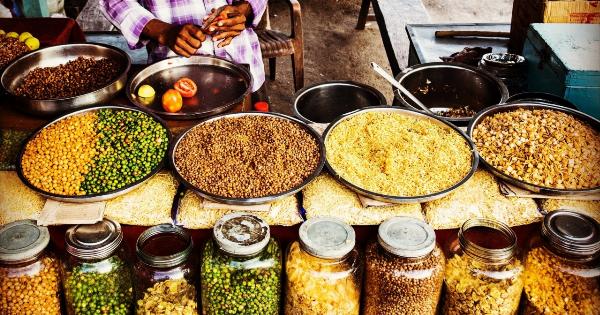Legumes are a nutritious food group that includes beans, lentils, peas, and chickpeas. They are packed with protein, fiber, vitamins, and minerals, making them an excellent addition to a balanced diet.
However, some people experience bloating and discomfort after consuming legumes. If you find yourself in this situation, don’t worry! In this article, we will discuss some tips and tricks to help you avoid bloating while enjoying the nutritional benefits of legumes.
1. Soak and Rinse
One common cause of bloating when consuming legumes is their high content of oligosaccharides, a type of carbohydrate that can be difficult to digest.
Soaking and rinsing legumes before cooking them can help reduce their oligosaccharide levels, making them easier to digest and reducing the likelihood of bloating.
To soak legumes, simply place them in a bowl, cover them with water, and let them sit for several hours or overnight. Rinse the legumes thoroughly before cooking them to remove any leftover oligosaccharides.
2. Start with Small Amounts
If you’re new to consuming legumes or have experienced bloating in the past, it’s best to start with small amounts and gradually increase your intake over time.
This allows your body to adjust to the high fiber content of legumes and reduces the likelihood of bloating.
Start by introducing legumes into your diet once or twice a week, in small portions. As your body becomes accustomed to them, you can gradually increase the frequency and amount of legumes you consume.
3. Cook Them Well
Cooking legumes thoroughly can also help reduce the likelihood of bloating. Heat breaks down the complex carbohydrates in legumes, making them easier to digest. Be sure to cook them until they are soft and tender.
Using a pressure cooker or slow cooker can also be beneficial, as these cooking methods further break down the carbohydrates.
If you’re using canned legumes, make sure to drain and rinse them before consuming to remove any excess sodium and other additives.
4. Pair with Digestive Spices
Adding digestive spices to your legume dishes can help enhance digestion and minimize bloating. Spices such as cumin, ginger, turmeric, and fennel seeds have been traditionally used to aid digestion and reduce gastrointestinal discomfort.
You can incorporate these spices into your legume recipes by adding them during the cooking process or sprinkling them over your prepared dishes.
5. Increase Water Intake
Proper hydration is essential for maintaining healthy digestion. Increasing your water intake when consuming legumes can help prevent bloating. Water helps soften the fiber in legumes and aids in their digestion and movement through the digestive tract.
Make sure to drink enough water throughout the day, especially when consuming legume-rich meals. This will help keep your digestive system functioning smoothly and reduce the chances of bloating.
6. Consider Digestive Enzymes
If you frequently experience bloating after consuming legumes, you may consider taking digestive enzyme supplements. These supplements contain enzymes that help break down carbohydrates and proteins, aiding in their digestion.
Consult with a healthcare professional before starting any new supplements to ensure they are safe and suitable for your specific circumstances.
7. Opt for Fermented Legumes
Fermentation is a process that enhances the digestibility and nutritional value of legumes. Fermented legume products, such as tempeh and miso, undergo a natural fermentation process that breaks down complex carbohydrates.
These fermented alternatives can be easier to digest and generally cause less bloating compared to their non-fermented counterparts. Incorporate fermented legumes into your diet as a tasty and gut-friendly option.
8. Seek Professional Guidance
If you have tried various strategies to reduce bloating with legumes but still experience discomfort, it’s essential to seek professional guidance from a registered dietitian or healthcare provider.
They can assess your individual situation, conduct tests if necessary, and provide personalized recommendations to address your concerns.
9. Gradually Increase Fiber Intake
Legumes are high in fiber, which is known to promote healthy digestion and prevent constipation. However, abruptly increasing your fiber intake can lead to bloating and gas.
If you’re not accustomed to a high-fiber diet, it’s crucial to gradually increase your fiber intake.
Adding small portions of legumes to your meals and gradually increasing the amount over time allows your body to adjust to the increased fiber intake, minimizing the chances of bloating.
10. Practice Mindful Eating
Mindful eating involves paying attention to the sensations and cues of your body while enjoying your meals. This practice can help you better understand your body’s response to different foods, including legumes.
When consuming legumes, eat slowly, chew thoroughly, and pay attention to how your body reacts. If you notice any discomfort or bloating, take note of the portion size or cooking method used.
This information can help you tailor your legume consumption to minimize bloating in the future.






























